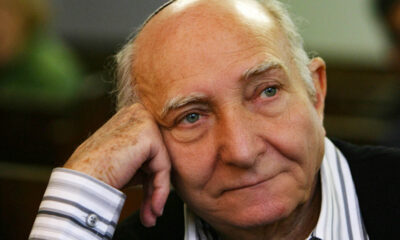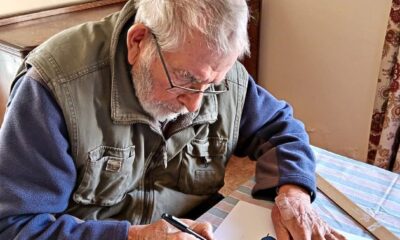
Featured Item

Rabbi Ben Isaacson – a maverick soul finds rest
I could write a standard obituary tribute to Rabbi Ben Isaacson. I could praise his Torah knowledge, his love for the biblical prophets, his passion for Israel, and his voluminous writings.
It would be a dull and boring literary piece that would give no insight into the unique character and genius that was Ben Isaacson. Ben was no cowering wallflower, he was a man with a big ego, who wanted his story told, and what a unique story it was.
Ben was crazy, quirky, and off-beat in the way that genii are often misunderstood. He was a unique maverick, that no one could force-fit into the standard rabbinic mould, yet most of all, he longed for acceptance by the rabbinic establishment after a long journey in the wilderness.
When the late Suzanne Belling was appointed Isaacson’s biographer, he regaled her with colourful stories of a life well lived, anecdotes of trips to the south of France, love affairs, adoring groupies, and tennis games in the searing tropical heat with the Palestinian Liberation Organisation’s representative to Zimbabwe.
But that wasn’t the story that his family wanted told, and so the book was edited, re-written, and stripped bare of its life. When the toned-down version of the book was submitted to the establishment for a foreword, the response was less than enthusiastic. A book on the angry biblical prophets, would be so much more appropriate, they thought.
So resultantly, we were deprived of a unique glimpse into the life of the most rebellious rabbi to have ever graced the pulpit in South Africa.
Over many cups of tea in his apartment, near the iconic Doll House Roadhouse, Isaacson, would tell me about his life, his struggles, and his vindication as South Africa’s most iconic anti-apartheid struggle rabbi. He longed for recognition for his political and humanitarian work from the Jewish community, which he never truly received.
Ben, whose impeccable social-justice credentials were beyond reproach, was a proud Zionist, and vociferous supporter of the state of Israel, where he had lived for many years. He wasn’t shy to call out antisemites, and considered the Boycott, Divestment, Sanctions movement a thinly disguised form of antisemitism.
My interview with him was published some years back in the SA Jewish Report, but parts deserve repeating here.
“It portended an ominous Shabbat evening in 1957, when Rabbi Ben Isaacson, assistant to Chief Rabbi Louis Rabinowitz, rose to the pulpit of The Great Synagogue in Wolmarans Street, Johannesburg. After a rousing sermon about the ‘twelve spies’ who scouted the land of Israel, during which Isaacson had unequivocally condemned the racist policies of apartheid, the president of the Wolmarans Street Shul, Percy Yutar, dismissed Ben Isaacson on the spot. Yutar would later be the infamous state-prosecutor who prosecuted Nelson Mandela at the Rivonia Trial, and who called for the imposition of the death penalty on Madiba.”
And so began the journey of Ben Isaacson, the “struggle rabbi”. Sent into cherem(banned) for the sin of condemning apartheid, Isaacson found himself rabbi to the small conservative community of Krugersdorp, west of Johannesburg. The day after the Sharpeville Massacre in 1960, Isaacson travelled to the blood-soaked streets of the dusty township, where 69 protestors had been mowed down by police in a protest against oppressive apartheid pass laws.
Together with other clerics, Isaacson visited the hospital and morgue to see the lifeless bodies caked in mud and blood. That evening, Isaacson’s home in Krugersdorp was raided by the security police. His library of struggle and Jewish religious books was confiscated and never returned. His wife and young daughter were traumatised by the rifle-wielding uniforms. Police even cut open the mattress of baby Ilana Isaacson’s crib, looking for evidence against the Jewish clergyman.
At that time, Isaacson was also harbouring the young children of anti-apartheid activist Ben Turok, who together with his wife, Mary, were on the run from the police. Indeed, Isaacson and his then wife, Ann, were regularly providing a safe house for African National Congress (ANC) operatives to meet.
The “rebel rabbi” was too much for Krugersdorp, and Isaacson was under extreme pressure to resign. This time, he was sent further into the purgatory of Bloemfontein, no place for a member of the Congress of Democrats. In Bloem, Isaacson would be broken, and he once again became a rabbi with no pulpit.
The friendship between Isaacson and struggle heroes Beyers Naudé and Helen Joseph was so deep that when he was left an unemployed rabbi, Naudé, the head of the South African Council of Churches, would send the rabbi a monthly cheque.
Isaacson is the only rabbi in South Africa to have ever joined the banned ANC. While in exile in Zimbabwe, Thabo Mbeki, who would later become the second president of South Africa, came for Shabbat dinner and loved the chopped liver. When Isaacson returned from exile to South Africa, he asked Mbeki, “Why have you forgotten me?” Mbeki replied, “We will never forget you,” yet, says Isaacson, “they did”.
Isaacson’s religious journey lead him through many flavours of the Jewish faith, including his own Har’el branded congregation along the M1 highway in Houghton, Johannesburg. Ultimately, he returned to Orthodox Judaism where he felt most at home and where he believed he had the most to contribute. Whether the Orthodox establishment truly accepted him back into its fold played heavily on his mind.
As Rabbi Isaacson’s body is laid to rest this week, South Africa should mourn one of its true struggle heroes, an anti-apartheid icon, a rabbinic genius, and a true maverick, who looked at the world and was determined to make life better for all who live in it. Therein lies the greatest Jewish lesson that Rabbi Ben Isaacson could ever teach – the true meaning of what it means to be a Jew.











Bill Anderson
August 21, 2024 at 10:25 pm
Was this the Ben Isaacson who edited the,Dictionary of The Jewish Religion, with David C. Gross?